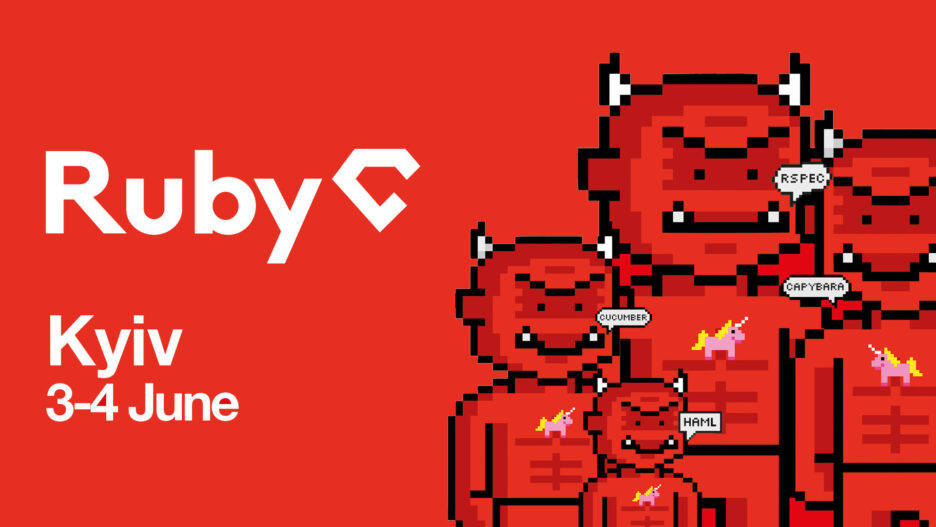The RubyC conference is celebrating its 5th birthday this year.Organized by the Svitla Systems, the conference traditionally gathers all the Ruby enthusiasts in Kiev during the first summer weekend. This year is no different and the conference brought together hundreds of people from all around the globe. They had a perfect chance to communicate in the framework of informal discussions. Nevertheless RubyC continued a good tradition of two lecture days, during which the guests covered the hottest topics one could only ask for. The festive RubyC 2017 conference ended with a groovy party to seal the 5th year of the international Ruby community gathering.
For this particular occasion RubyC was moved to a special venue – the Bel Etage Concert Hall - which suggested more room and the biggest screen in the history of the conference.
Participants had an opportunity to choose either the ground floor or the balcony, to taste exclusive dishes at the L'étage restaurant and enjoy all the benefits of the concert hall sound system. Overall, this might become the constant venue for the RubyC conference from now on.
The organizers thank all those who helped bring this positive event into life: the Media Partners, the Golden Sponsor – MLSdev and the Ruby Sponsors - GlobalLogic and TopTal.
The conference 2017 would be incomplete without those guests who took the stage for a good talk and covered the topics all the Ruby enthusiasts were interested in. There were 13 honorable speakers this year: Bozhidar Batsov (Bulgaria), Xavier Noria (Spain), Quentin Adam (France), Serdar Dogruyol (Turkey), Florian Gilcher (Germany), Piotr Szotkowski and Piotr Solnica (Poland), Marat Kamenschikov (Ukraine), Anton Honcharuk (Ukraine), Bogdan Gusiev (Ukraine), Viacheslav Shvetsov (Ukraine), Stanislav Volovyk (Ukraine) and Sergiy Kukunin (Ukraine).
The event was hosted by Sergei Ponomarov and Ben Lovell. There were about 360 participants at the conference in 2017. The global RubyC community continues to grow each year.
RubyC 2017 video highlights!
The conference 2017 welcomed 13 honorable guests, and their particular talks are worth being highlighted separately.
Piotr Solnica (Poland)
Topic: Persistence pays off: a new look at rom-rb
This talk is an introduction to rom-rb. The speaker explains why rom-rb functions much better than Active Record. His attention is paid to the flexible data transformations, altering data with changesets, functional data processing and the importance of type-safety.
Piotr Szotkowski (Poland)
Topic: Ruby Smells
This talk shows the way one can effectively use such tools as RuboCop and Reek to make static code analysis possible even though Ruby is highly dynamic. The speaker also highlights specific approaches which help make informed decisions on when and how to refactor and learn over time to spot potential code smells when those are introduced.
Florian Gilcher (Germany)
Topic: #Potential
This talk covers the growing communities’ problem along with the untapped potentials it brings. The speaker introduces several efficient, cost-saving solutions to tap into the growing community potentials for the projects of different scale (collected within the framework of the Rust community team at Ruby Berlin e.V. and within the Padrino framework). This talk also introduces basic techniques of creative approach to the community activities.
Serdar Dogruyol (Turkey)
Topic: Crystal (a Ruby-like programming language)
This talk is dedicated to Crystal – the Ruby inspired programming language. This language is as fast as C, but as beautiful as Ruby. The speaker introduces specific features of Kemal – the fast and effective web framework written in Crystal.
Quentin Adam (France)
Topic: Problems you’ll face in the microservice word: configuration, authentication
This talk is dedicated to a microservice issue, in particular – authentification and configuration. There are many ways to achieve distributed authentification, though it’s hard in general. Talking about configuration there are several questionable issues as well, specifically when one deals with the distributed micro application strategy. So this talk returns to experience of building a microservice strategy.
Xavier Noria (Spain)
Topic: Little Snippets
The speaker is going to introduce a topic about several concepts, such as idiomatic Ruby, concise code, readable code and exact code. The talk touches the aspects of how these concepts are applied and how subjective or social they are.
Bozhidar Batsov (Bulgaria)
Topic: Ruby 4.0: To Infinity and Beyond
The speaker introduces a special talk about the Ruby language, its ecosystem and community. The talk is also dedicated to picturing a course towards a mystical release of Ruby 4.0, which can ensure Ruby’s dominance.
Anton Honcharuk (Ukraine)
Topic: React integration into existing Rails applications
This talk is dedicated to three basic ways the developers can go with integration of React (popular JS lib for building UIs) into existing Rails application. This topic also introduces the way to move from rendering HTML on server to SPA app through that integration.
Sergiy Kukunin (Ukraine)
Topic: Tackling complex architecture in Ruby
This talk covers the criteria of good and bad architectures, common approaches to what can be called a good architecture and the way to apply it in the Ruby ecosystem. There are several basic issues mentioned: heart of software development, intention-revealing programming, SOLID principles and TDD. There are several advanced techniques mentioned as well, such as domain-driven design and functional programming.
Stanislav Volovyk (Ukraine)
Topic: Ruby native extensions and what's wrong with them
The speaker talks about the Ruby native extensions, the dependencies a gem requires, the need of a system library gem and the OS package which provides you with what the gems require.
Bogdan Gusiev (Ukraine)
Topic: Optimizing SQL Queries
The talk is going to cover the problem of optimization using specific approaches, such as avoiding the query completely or using in-depth SQL query execution guides.
Viacheslav Shvetsov (Ukraine)
Topic: Testing. Why so serious?
The speaker introduces an alternative approach to the testing problem. Any effective test coverage affects the speed of the test completion in the long run. But one can handle trouble with no need for numerous coffee-breaks, at least following this particular alternative path.
Marat Kamenschikov (Ukraine)
Topic: Learning Elixir: gotchas and pitfalls
This talk is dedicated to the potential controversial issues around the Elixir language and the Elixir-based Phoenix framework, which has become another Rails competitor with all the features of Erlang. But is there any opportunity for the Elixir language to overcome Ruby? And is there any chance Rails developer will switch to Elixir? The speaker is going to frame the basic gotchas and pitfalls of this perspective and cover the pattern matching, Math, Phoenix project overview, Phoenix without Phoenix and heroku Elixir deployment.
Thank you for your participation and welcome to join the community next year in Kiev at the RubyC-2018!




![[Blog cover] Interview with Natalia Anon](https://svitla.com/wp-content/uploads/2025/06/Blog-cover-Interview-with-Natalia-Anon-560x310.jpg)